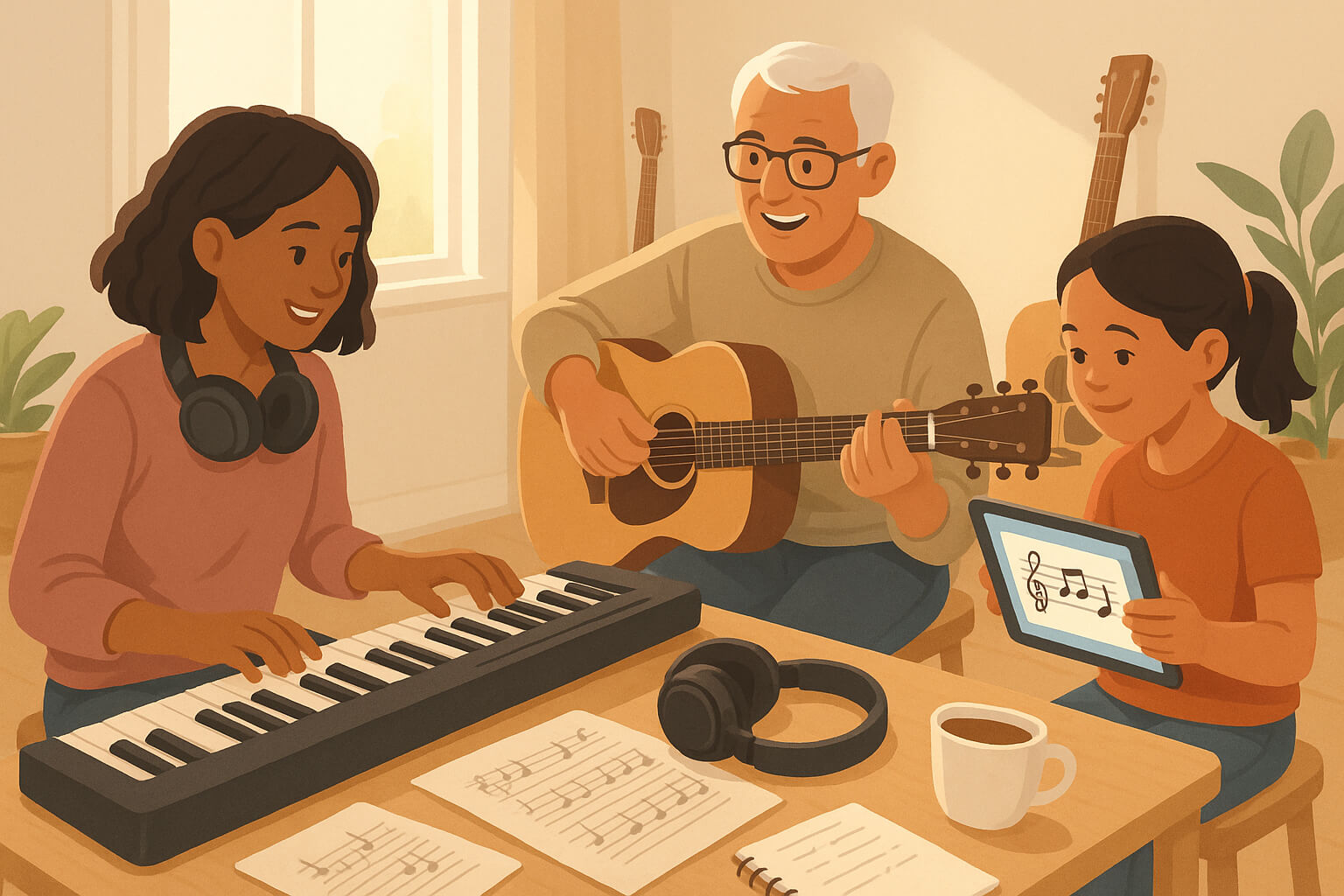What is the Easiest Instrument for Adults to Learn from Scratch?

It’s Never Too Late to Learn Music — Start Your Journey from Scratch (Free Tools Included!)
- There’s a common myth that if you didn’t start learning music as a child, you’ve missed your chance. That’s completely false.
- In 2025, anyone can learn music at any age—thanks to a flood of beginner-friendly apps, interactive online lessons, and free tools that make learning accessible, affordable, and fun.
- Whether you’re a complete novice or someone returning to music after years away, this guide will walk you through every essential step to start learning music—without expensive lessons or complicated theory.
1. Pick One Instrument to Focus On (Or Start with Your Voice)
- Don’t overwhelm yourself by trying to learn multiple instruments. Choose just one instrument that excites you.
- For beginners, the keyboard/piano, acoustic guitar, or even your own voice are perfect starting points because they teach you melody, rhythm, and harmony in the most intuitive way.
- No instrument yet? No problem.
- Experiment with free online piano apps to get a feel for keys.
- Warm up with vocal exercises on YouTube if singing interests you.
- Curious about piano? Take this Free 7-Day Piano Challenge designed for absolute beginners.
- Guitar more your style? Download Justin Guitar’s Free Chord Guide—a brilliant, visual resource to get your fingers moving.
- Remember: You don’t need to be perfect—you just need to start. Progress comes with small, daily steps.
2. Learn the Basic Building Blocks of Music (Without Fancy Terms)
- Music might seem complicated, but it’s built on simple, universal concepts:
- Notes: The basic sounds (A, B, C…)
- Scales: A group of notes that work well together.
- Rhythm: The timing and beat of the notes.
- Chords: Groups of notes played together to create harmony.
- You don’t need to dive into dense theory books. Start with MusicTheory.net’s interactive lessons that explain notes, rhythms, and chords in plain English.
- If sheet music feels intimidating, this visual guide for reading music breaks it down step-by-step—turning music reading into a fun, puzzle-like activity rather than a chore.
- Once you’re comfortable, explore why learning music theory early can accelerate your growth—especially if you dream of playing by ear or writing your own songs later.
3. Use Free Apps and YouTube to Practice—No Teacher Required
- Thanks to mobile apps, your phone or tablet can now double as a personal music coach. Apps like Simply Piano, Yousician, and Piano Academy provide interactive lessons that:
- Listen to your playing and give instant feedback.
- Track your progress with gamified rewards.
- Offer beginner-friendly practice routines.
4. Train Your Ears to Hear Music Better
- Great musicians don’t just play notes—they hear them. Ear training helps you:
- Recognize melodies and intervals by sound.
- Understand how chords and harmonies fit together.
- Play songs by ear, even without sheet music.
5. Silence Self-Doubt—Progress Isn’t About Talent
- Many adult learners struggle with self-doubt. “It’s too late.” “I don’t have talent.” These are just myths.
- In truth, daily practice, not innate talent, is what builds musical ability. Adults often learn faster because they are more disciplined, goal-oriented, and self-aware.
- When you feel stuck, use this practical guide to overcoming learning plateaus to stay motivated and adjust your practice routines.
- Beyond skills, playing music has proven emotional and mental health benefits. It can reduce anxiety, improve focus, and even boost memory retention. Explore how learning music strengthens your brain and well-being here.
6. 🎶 Start Creating Music with Free AI Tools (No Experience Needed)
- Once you’ve grasped the basics, it’s time to explore your creativity. You don’t need to be a composer—modern AI tools let you create your own music instantly.
- Platforms like Soundraw.io and Mubert Render let you:
- Choose a mood (chill, cinematic, upbeat, etc.)
- Pick a genre (lo-fi, EDM, classical)
- Set tempo, length, and vibe
- In seconds, you’ll have a royalty-free track you can use for practice, content creation, or even personal projects. This is a fantastic way to explore song structure and understand how music is built, without needing advanced knowledge.
- Curious about how AI is transforming music creation? Dive into this insightful overview of AI’s role in music production here.
Final Thoughts: You’re Not Late—You’re Right on Time
Learning music isn’t a race. Whether you’re 18 or 58, the tools available today mean you can start small, learn at your own pace, and express yourself through music in ways you never imagined.
You don’t need private lessons or expensive gear. With resources like:
- Free chord eBooks
- Interactive apps for guided practice
- Free AI music generators for creativity
- Beginner-friendly theory guides
—your musical journey is more accessible than ever.
- Pick one instrument.
- Learn music in simple steps.
- Practice a little each day.
- Listen, create, and enjoy the process.
It’s never too late to learn music—it’s only too late to never start.
